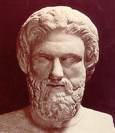Who was Aristophanes? (448?-385 B.C.) Aristophanes was a Greek playwright who wrote “old comedy.” Most of his work came near the end of the Peloponnesian War when Athens faced defeat by Sparta (431-404BC). Aristophanes also served as head of the Athenian Council. Eleven of about 40 of his plays survive, nine of which relate to the War.
Historical context. In 480 B.C. the Athenian fleet defeated Persia in the Battle of Salamis off the Aegean coast. This led directly to the ascent of Athens under Pericles and the “Golden Age of Greece.” Democratic government, philosophy, building design, and drama made Athens famous. Socrates and a school of thought known as Sophistry arose at about the same time. Sophistry (sophia=wisdom) was the use of rhetoric and logic to argue and persuade, sometimes without concern for truth. It was the Sophists who coined the phrase, “man is the measure of all things.” Sadly, Athens’ growth of power tempted Sparta to attack, starting the Peloponnesian War (431). Peloponnesia is the large “island” at the southern tip of Greece. It is connected to the mainland by a narrow isthmus.
Clouds was produced at the Great Dionysia festival of 423. This was during the first phase of the war. Dionysus was the “god of wine and vegetation” who demanded ecstatic, orgiastic worship. He was said to die each winter to be reborn in the spring. This cult made merry in the bawdy, chaos festivities of the Greek theater. Throughout history it has inspired revolutionary fervor. The old culture must die so the new can be reborn.
Summary of Aristophanes’ teaching. We focus on Clouds because Aristophanes felt it was his greatest play. It also provides comment on Socrates and the new philosophy he gave to Athens and the world. The radical nature of Socrates’ thought was felt keenly in Athens and led at last to his death. The threat was not in the use of logic and rhetoric per se, but the abuse of these skills. They were used to make man the measure of all things at the expense of other worldly authority.
The charges against Socrates were almost the same as the bawdy, comic critique of Aristophanes. In general, Clouds accuses Socrates of atheism. He was also accused of operating a for-profit school teaching youth to subvert truth and the settled customs of the city via harmful use of rhetoric. Socrates was branded an atheist because of alleged neglect of the Greek pantheon in favor of human reason. The pantheon was the group of Greek deities. Thus, he was reputed to have shifted man’s focus away from the transcendent, which exists apart from the material universe, onto the immanent. Immanent has to do with that which suffuses the material world. Socrates denied this at his trial and it conflicts with Plato’s picture of his mentor. Plato reported that Socrates opposed the sophists, was pious, and did not charge a fee for his teaching.
It is reported that Socrates took his lampooning with grace when he first attended the play. But by 399, things had turned ugly. Sparta won the war and Socrates was blamed for the moral decline of the city. To show the dramatic tension between the old and the new, Aristophanes sets up a number of warring polarities:
Socrates is forced into the mold on the left side of these polarities. Some call this unjust based on the reports left by some of his students. Socrates is floating in a basket, with his head in the vacuous, ever-shifting clouds. He is aloof from the real world. Strepsiades, on the other hand, is a capricious or irregular example of the “old school.” He is willing to embrace the new approach if it will work to his advantage in paying off his debt.
Implications for subsequent history. Although Socrates lost the battle his philosophy has carried the day. Few have heard of Aristophanes, whereas “Socrates” is almost a household word. Moreover, his philosophy and that of his students, Plato and Aristotle, have reached into every nook and cranny of modern life.
Biblical analysis. God and his people, however, will win in the end. Both the conservative philosophy of Aristophanes and the liberal philosophy of Socrates stand condemned by the Bible. As Pheidippides notes, human law is merely convention subject to change. “Where is the wise?” asks the apostle, “…Where is the disputer of this world? Hath not God made foolish the wisdom of this world?” (I Cor. 1:20)
Corrective or prescriptive actions. Conservatism rants and raves, but always caves in to the novelty of liberalism. This is because it is not firmly grounded on the truth of God’s Word. Christians must never forget that their coalitions with Conservatives are an “uneasy truce” with a man-centered philosophy.


